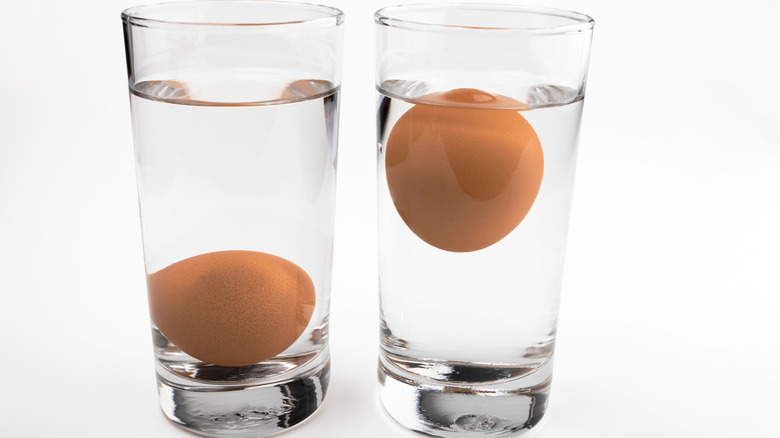How To Tell If Your Eggs Have Gone Bad
Not all egg cartons are marked with an expiration date. The U.S. Department of Agriculture (USDA) doesn't require it, and some states disallow it. When you see an expiration date on an egg carton, the USDA recommends regarding it as a sell-by date – and a hard one at that (i.e., don't buy eggs after that date). Nevertheless, assuming proper handling, you'll still have between three and five weeks after that date to consume the eggs before they've gone bad — as in, not usable without risking foodborne illness.
Although that's a lot of wiggle room, federal law provides a helpful clue by requiring all egg cartons to be marked with their pack date, expressed as a three-digit number between 1 and 365 (corresponding to one day of the calendar year). Also, assuming proper handling, eggs can stay fresh for four to five weeks from their pack date.
That still leaves room for interpretation, but in most cases, the eggs' handling is the biggest wild card. Proper egg handling requires refrigeration consistently at or below 40 degrees Fahrenheit, and eggs should be considered "bad" if they've gone two hours without refrigeration (one hour at ambient temperatures of 90+).
But you can't always know how eggs were handled along the supply chain. Accordingly, for optimal quality and food safety, it's a good practice to assess the freshness of your eggs before using them. Here's how to tell if your eggs have gone bad.
Eggs start to smell bad when they've gone bad
Thanks to bacterial decomposition, many foods start giving off a rancid odor as they progress from fresh to spoiled. But when eggs go bad, they give off a distinctly recognizable and notably foul smell. That's because eggs contain specific proteins, which, as they break down, interact with the egg's sulfur content to form hydrogen sulfide. That's the stinky gas associated with what people think is the "rotten egg" smell, whatever its source.
Regardless of the expiration date or packing date on a carton of eggs, if you crack open an egg and it gives off an odor, you should treat the egg as having gone bad. In other words, throw it away, and don't consume it. Moreover, the longer the egg is compromised, the worse the smell will be. In fact, at some point, the smell will likely become strong enough to be perceptible right through the egg's uncracked shell.
Accordingly, the smell test is a great place to begin when you aim to ascertain whether an egg has gone bad, regardless of its packing- or expiration/sell-by date. If an egg doesn't immediately strike you as funky-smelling, inside or outside the shell, that's a good sign. However, you'll also want to rely on some of your other senses.
Consider these visual signs of an egg having gone bad
You may ascertain whether an egg has gone bad just by looking at it in its shell. Variations in the eggshell's color, including mottling and speckles, do not usually indicate a problem. Instead, the visual cues that an egg has reached its actual expiration date and should not be consumed include a slimy look to its shell (which could indicate bacterial contamination) or the presence of a powdery substance on the shell (which could indicate mold). In addition, you should not consume any egg that comes to you with a cracked shell (unless it became cracked while boiling). Cracks in an eggshell can permit bacteria to enter at any point in time, even in your refrigerator, and even if you store your eggs in their carton as the USDA recommends.
That said, an egg may have gone bad even when it looks perfectly fine from the outside. Accordingly, as discussed herein, you should use your other senses for additional information. Moreover, when you eventually crack the egg, always observe the white for pink spots, green spots, or spots of iridescent white. All of these indicate spoilage.
Cloudiness does not, however; egg whites become clearer as they age. Nor are blood spots a sign of spoilage. Moreover, the appearance of the egg's yolk will also not offer much information — other than what the hen that laid it was fed.
Another visual cue is whether an egg can float in water
You may have heard about a "float test" to determine whether an egg is fresh, regardless of the date marked on the carton. To conduct the float test on an egg, fill a container with enough water to fully submerge it while still in its shell. If the egg sinks to the bottom, it is safe to eat. If it falls over on its side, this is an egg you'll want to consume as soon as possible because it's at its freshest.
The float test works because although eggshells are protective of the egg's contents, they are porous enough to allow air to enter. And they grow more porous over time, which allows more air to enter. The longer an egg sits around unconsumed, the more air the shell will contain. Accordingly, when an egg can float in water, that should be taken as a sign that it's old enough for significant air to have entered it.
That being said, just because an egg floats in water does not mean that it has necessarily gone bad, according to the USDA. An egg that can float in water may still be perfectly fine to consume, assuming it passes the smell and visual tests discussed above.
The sound of a bad egg
Between visual and olfactory cues and looking at the date(s) on the carton, you should be able to tell whether an egg has gone bad before you go to the trouble of cracking it, let alone cooking it. But some people swear they can tell whether an egg is fresh just by using their ears. Specifically, it's been said that if you gently shake an egg right next to your ear and you can hear the liquid moving around, the egg has gone bad. Like the float test, the shake test relies on eggshells being porous. Theoretically, if an egg can slosh around inside its shell, it's old enough to have taken on significant air.
But as with the float test, the "shake test" isn't dispositive as to whether your egg has gone bad. If you shake an egg and it makes a sound, it may still be perfectly fine to eat — as long as it doesn't have that distinctive sulfurous odor or any of the visual signs of spoilage discussed above. Likewise, if you shake an egg and it makes no sound, it's probably safe for consumption. However, you wouldn't want to ignore other more reliable clues (i.e., sight and smell).
Assuming that your eggs are fresh and you cook with them, do bear in mind that leftovers (e.g., egg salad) should be consumed within three to four days, according to the FDA.




